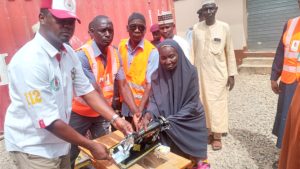community
Kaduna Govt. Distributes Welfare Equipment to Vulnerable Persons in 3 LGAs

The Kaduna State Emergency Management Agency (KADSEMA) has commenced distribution of welfare equipment to vulnerable groups in three local government areas (LGAs) of the state.
Muhammed Mukaddas, Executive Secretary of the agency, made this known on Tuesday while inaugurating the distribution exercise in Kaduna.
Mukaddas said the gesture was not compensation, but something to build their resilience, and increase capacities to absorb shocks in the face of disasters.
He said Gov. Nasir El-Rufai approved the equipment for onward distribution as part of government efforts to show concern to its citizens.
The executive secretary said that Igabi, Birnin Gwari and Zangon Kataf LGAs are the beneficiaries from the pilot phase while others will soon benefit.
He called on residents to continue to be security conscious, report suspicious activities to security agencies, and inform SEMA whenever there was need for humanitarian assistance.
Speaking on behalf of the chairmen, Gabriel Achi, Vice Chairman, Zangon Kataf LGA, commended Gov. El-Rufai for the gesture while assuring that the items would be distributed judiciously.
Two of the beneficiaries, Fatima Muazu and Jumai Adam thanked the state government for the gesture while assuring that the items would be used appropriately..
“These items are to empower us in supporting our families and not to be sold out,” they said.
The News Agency of Nigeria (NAN) reports that the items distributed were, grinding machines, welding machines, water pumps and sewing machines. (NAN)
community
OnTiv Professionals Association Condemns Claims on Yelwata by ALago Union
By David Torough, Abuja
The OnTiv Professionals Association (OPA), Abuja has described the statement credited to the Alago Ikweyi Gbayi Development Union (AIGDU) calling for land demarcation of Tiv ancestral homes, along Nasarawa and Benue boarder communities in the wake of the brutal attack and killings of innocent Benue citizens as insensitive, wicked and devoid of every sense of humanity and decency.
In a statement in Abuja, OPA President, Engr Abraham Aku regretted that, while the Benue community, the entire country and the world are yet to recover from the devastating effect and the pains over the June 13 Yelwata massacre by the armed Fulani invaders, the Alago people of Nasarawa State have sadly concerned themselves to claims of ownership of the bleeding community.
Aku said that the OPA read with deep concern and disappointment, the press release issued by the Alago Ikweyi Gbayi Development Union (AIGDU) in response to the remarks made by His Royal Majesty, the Tor Tiv, Prof. James Ayatse, during the condolence visit of President Bola Ahmed Tinubu to Benue State.
“We find it necessary to strongly respond to the misrepresentations and historical inaccuracies promoted in the said press release. The statement is a deliberate attempt to distort the identity, heritage, and territorial realities of the Tiv people in and around Yelwata.
“To set the historical facts clear, Yelwata, both in administrative record and practical governance, is firmly located in Guma Local Government Area of Benue State therefore, their claims that Yelwata is in Keana Local Government Area of Nasarawa State is historically and administratively incorrect.
“The community has functioned as such for decades, under successive civilian and military administrations, with Benue State government providing infrastructural services, conducting elections, and maintaining civil administration in the area.
“It is equally misleading to suggest that the Tiv are “latecomers” to Yelwata. The Historical Settlement Patterns shows that, the Tiv people have historically settled and cultivated lands across the Benue Valley, including Yelwata, long before modern administrative boundaries were imposed.
“Their presence is not merely residential but rooted in generations of ancestral occupation, farming, and social development.
“Moreover, the Tiv are recognized as indigenous peoples in parts of Nasarawa State, populating local government areas of Awe, Obi, Doma, Keana, and Lafia as well as
“Nigeria is a multi-ethnic society where communities are often plural in composition so,r their claims of ownership and indigenous rights that Yelwata is an “Alago village” because a few members of the Alago or Gwandara ethnic groups are present there is not a sound basis for such sweeping conclusions.
“What matters is legal and administrative jurisdiction, historical occupation, and the will of the people, all of which support Yelwata’s standing as part of Guma LGA in Benue State”.
According to Engr Aku, the reference to Google Maps as evidence that Yelwata location is captured in Nasarawa State is flawed and simplistic.
“Google Maps are not considered as legal authority for boundary demarcation. The authoritative sources for inter-state boundaries in Nigeria remain the National Boundary Commission (NBC), official gazettes, and constitutional/legal instruments and none of these place Yelwata in Nasarawa State.
“Rather than inflame ethnic sentiments or attempt to rewrite geography, we call on the AIGDU and other stakeholders to prioritize peaceful coexistence, justice, and mutual respect. Efforts to settle border issues must be guided by truth, not ethnic domination or historical revisionism.
“We call on the Nasarawa and Benue State Governments, the National Boundary Commission, and the Federal Government of Nigeria to accelerate efforts to resolve boundary disputes in a just and transparent manner.
“We reaffirm our support for the Tor Tiv’s position, which was factual, dignified, and reflective of the pain and reality of the Tiv people in Yelwata and its environs.Let the truth be told and peace be pursued'” the statement partly read.
| ReplyReply allForwardAdd reaction |
community
Democracy: Sen. Abiru Urges Support for Tinubu

Sen. Mukhail Abiru (APC -Lagos) has urged continued support and understanding for President Bola Tinubu as he implements bold policy decisions aimed at repositioning the nation for sustainable growth.
This is contained in his democracy day message by his Media Aide, Mr Enitan Olukotun on Thursday in Ikorodu.
Abiru, who represents Lagos-East, urged Nigerians not to loose hope but to continue to uphold the core values of democracy and seek constructive ways to consolidate the gains made over the years.
Abiru, who is also the chairman, senate Committee on Banking, Insurance and Other Financial Institutions, stated that the democracy day called for reflection and appreciation for how far Nigeria had come as a democratic nation.
“It has been 26 years since Nigeria began its journey under this current democratic dispensation.
“Though the path has not been without challenges, we have every reason to celebrate the resilience, growth, and promise that our democracy represents.
“As we navigate this critical period in our nation’s history, I call for continued support and understanding for our dear President as he implements bold policy decisions aimed at repositioning our nation for sustainable growth.
Though the sacrifices may be difficult, they are necessary, and I am glad that the rewards have started manifesting across all sectors.
” I pay special tribute to the resilience, courage, and determination of the Nigerian people,” he said.(NAN)
community
Sallah Was Good for Our Business—FCT Beauticians

Beauticians, hairdressers, and grooming specialists across the Federal Capital Territory (FCT) said they recorded massive patronage during the just-celebrated Eid-el-Kabir festival.
During a visit to various salons and beauty parlors on Tuesday, beauticians said they had a huge customer turnout during the festive period.
Beauty professionals expressed immense satisfaction with the season’s turnout, describing it as one of the most rewarding times of the year.
Mrs Sahadatu Musa, a hairstylist in Nyanyan, shared her delight over the brisk business, noting the direct financial impact.
“I’m so happy. Business was great.
“What I’ve earned in the festive period will cover my children’s school fees and even new clothes for them.
It’s a real relief,” she said.She added that service rates typically rose during the festive season due to high demand.
“I handled more than 50 clients in a day during the festive period and as the day was not even over yet, many customers still came.
“Some clients opted for home services to beat the long queues at salons.
“It cost more, N6,000 instead of the usual N4,000 but it was worth it,” she said.
Mr Abubakar Abdellah, a henna Artist in Lugbe, also reported strong demand, noting that festive designs were particularly popular.
“Red henna went for N4,000, while the black variety costs N8,000.”
Barbers also experienced a surge in patronage.
Mr Kabiru Umar, a barber in Bwari, noted that he had to expand both his services and workforce to meet the growing demand.”
“Parents came in with their kids for haircuts, beard trims, and general grooming.
“We even added services like manicures, pedicures, and face massages.
“To keep up, I upgraded equipment, restocked supplies, and hired more hands,” he said.
For tailors, the period was equally hectic.
Zainab Abubakar, a tailor in Jikwoyi, who specialises in women’s wear, described it as the busiest and most profitable season.
“Orders started coming in two to three weeks before Sallah, but the real rush hit in the final days.
“Women wanted abayas made from lace, chiffon, or crepe, modest but stylish.
“I even had to turn down some orders. Time management was crucial or you would end up disappointing people,” she said.
From makeup artists to barbers, stylists, and tailors, professionals across the FCT said the 2025 Eid-el-Kabir was not only spiritually uplifting but also financially and professionally rewarding, marking a truly successful and fulfilling holiday season.(NAN)




















